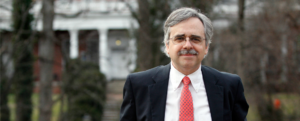There’s no question the first four presidents of the internet age are different, but Bill Clinton, George W. Bush, Barack Obama and Donald Trump share one thing in common: They have emphasized their personal character to win office and to fight back against critics. In his new book Presidential Communication and Character: White House News Management from Clinton and Cable to Twitter and Trump, University of Mary Washington Political Science Professor Stephen J. Farnsworth examines how presidents sell themselves and their policies in an ever-expanding and sometimes precarious media environment.

“Character conversations are ideal for a modern media system that gives rise to short-attention-span politics,” said Farnsworth, a sought-after political commentator who has spent decades researching presidential communications. “They also serve the politicians’ interests, as constantly distracted news consumers may not remember when politicians said one thing yesterday and a different thing today, much less punish them for inconsistency. With the various modern media cocoons that exist today, a person may never hear a president called to account for a comment that turned out to be false.”
Other key takeaways from the book include:
- The no-holds-barred online coverage provides the president with new and often intensely loyal allies, but that environment also amplifies the voices of equally aggressive and relentless enemies who counter-frame a president’s news narrative in peer-to-peer communication venues like Twitter and Facebook.
- Presidents like Trump who focus on personal loyalty when they hire top aides rather than focusing on professionalism and experience are asking for trouble. The “group think” of loyalists has led many recent presidents to become blind to what these tight circles of loyalists do not expect, like George W. Bush and the Iraqi resistance.
- Even if social media providers succeed in their promised efforts to flag false content with fact-checking algorithms, that effort seems less likely to elevate the conversation. What’s to keep the people who want to receive stories about the next “Pizzagate” from migrating to another media platform that has no such “good government” compunctions? Irresponsibility on the web may be a profitable way to distinguish one’s web operations.
- Trump’s presidency offers an interesting test of his self-proclaimed negotiating shrewdness. Although it’s too soon to tell whether Trump’s disparaging threats to North Korea will lead to moderating the rogue nation’s leader behavior, it’s clear the president wants character issues at the center of conversations in both international relations and domestic politics.
- Whether Trump is the start of a new era in presidential communication will depend largely on the success of his presidency. Business and Hollywood celebrities are debating whether to launch their own political careers in the wake of Trump’s presidential election victory. If Trump is re-elected in 2020, expect even more celebrity-turned-politicians to run for office.
Farnsworth’s latest work, published by Routledge Press, is his sixth book that examines presidential communication, the mass media and U.S. public opinion. He is widely quoted in the media, including CTV, U.S. News & World Report, and The Washington Post, on presidential and Virginia politics.
A professor at University of Mary Washington for 18 years, Farnsworth established the University’s Center for Leadership and Media Studies. He is recipient of the 2017 Virginia Outstanding Faculty Award by the State Council of Higher Education of Virginia (SCHEV), and was recognized for his service to the national political science honor society Pi Sigma Alpha. The University has bestowed four teaching honors, including the Alumni Association Outstanding Young Faculty Member Award, the Mary W. Pinschmidt Teaching Award, the Richard Palmieri Outstanding Professor Award and the Waple Research Professorship Award.
For more information, contact Farnworth at sfarnswo@umw.edu or 703-380-3015.